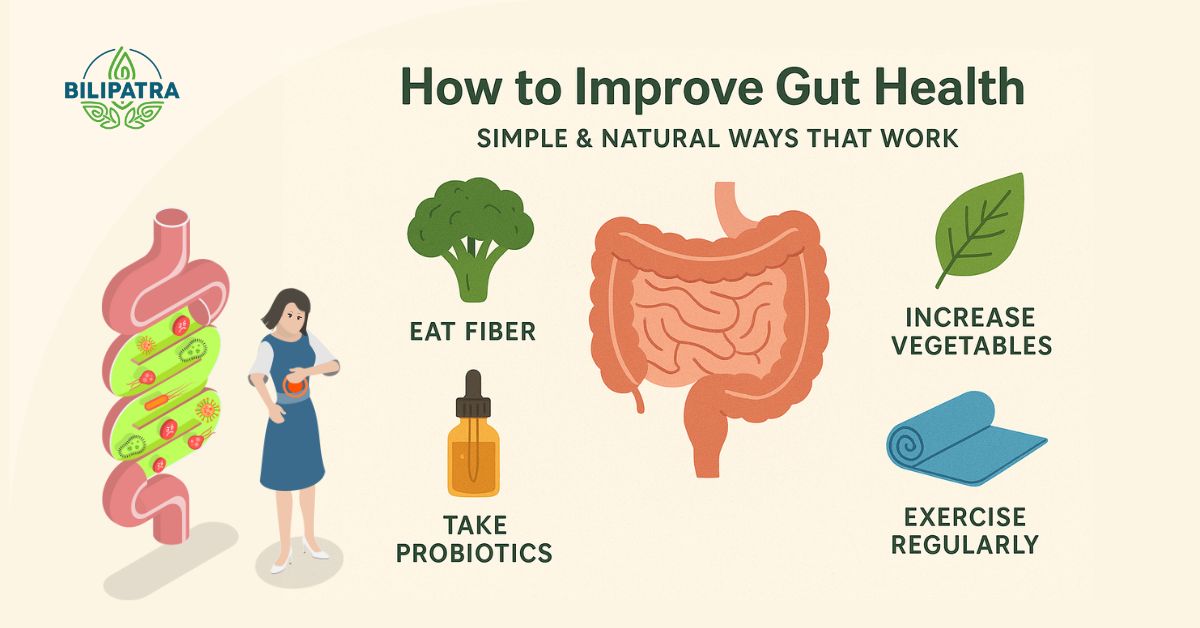Your gut health plays a big role in your overall well-being. A healthy gut supports digestion, strengthens your immune system, balances your mind, and boosts your energy.
People often ignore gut health when everything feels normal. But poor gut health shows up in many ways. It causes stomach pain, lowers energy, weakens immunity, and even affects mood.
Modern lifestyles make gut health worse. Stress, junk food, and irregular eating habits disturb the good bacteria in your gut.
This article covers 7 practical, research-based ways to improve and restore balance in your gut and make lasting improvements to digestion.
Why Gut Health Matters
Before we look at the Gut Health solutions, let’s understand why gut health matters.

-
The human gut hosts trillions of bacteria, both good and bad.
-
A healthy balance of these bacteria helps your body digest food, absorb nutrients, and fight infections.
-
When the balance breaks, gut health suffers. This can cause constipation, bloating, weak immunity, skin troubles, and even anxiety.
By making small lifestyle changes, you can restore balance and improve your digestion naturally.
7 Simple & Natural Ways to Improve Gut Health
1. Eat More Fiber
Fiber keeps your digestive system working smoothly. It also feeds the “good” bacteria in your gut, helping them grow stronger.
Gut-friendly, fiber-rich foods include:
-
Whole grains like oats, barley, and brown rice
-
Legumes such as beans, lentils, and chickpeas
-
Fruits like apples, bananas, and berries
-
Vegetables such as broccoli, spinach, and carrots
Tip: Add both soluble and insoluble fiber to your meals to get the best benefits for your gut.
2. Include Probiotics in Your Diet
Probiotics are live bacteria that help maintain balance in your gut. They improve digestion, reduce bloating, and strengthen your immunity.
Natural probiotic-rich foods include:
-
Yogurt with live cultures
-
Curd
-
Kefir (a fermented milk drink)
-
Sauerkraut and kimchi
-
Miso and tempeh
Tip: If you don’t get enough probiotics from food, you can consider supplements - but always talk to your doctor before starting them.
3. Stay Hydrated
Water keeps your digestive system working smoothly. It breaks down food, helps your body absorb nutrients, and keeps your intestines lubricated.
Aim to drink 7–8 glasses of water daily, and adjust the amount based on your activity level and the weather.
4. Reduce Processed Foods and Sugar
Processed foods and excess sugar feed harmful bacteria in your gut. This upsets the balance and causes inflammation.
Instead, choose whole and natural foods such as:
-
Fresh fruits and vegetables
-
Lean proteins like chicken, fish, or tofu
-
Whole grains
-
Nuts and seeds
Tip: Cutting back on sugary drinks and packaged snacks can improve your gut health within weeks.
5. Manage Stress Effectively
Stress directly affects your gut health. High stress can cause bloating, constipation, or diarrhea.
Simple stress-relief practices include:
-
Meditation and breathing exercises (Pranayama)
-
Yoga or light exercise
-
Adequate sleep and rest
-
Listening to music or enjoying a hobby
-
Spending time in fresh air and greenery helps calm the mind, reduce stress, and improve gut health
-
Daily physical activity (even a 20-minute walk is beneficial)
6. Get Enough Quality Sleep
Your gut needs proper rest to repair and function well. Poor sleep disturbs the gut-brain connection and leads to digestive problems.
Aim for 7–9 hours of quality sleep each night. Stick to a routine, limit screen time before bed, and build a relaxing nighttime habit.
7. Exercise Regularly
Exercise helps food move smoothly through your digestive system and supports healthy gut bacteria growth.
Gut-friendly exercises include:
-
Walking
-
Jogging
-
Cycling
-
Yoga
-
Strength training
Tip: Try to do at least 30 minutes of moderate exercise most days of the week.
Quick Recap
Improving gut health doesn’t have to be complicated. Here’s a quick summary of the 7 steps:
-
Eat fiber-rich foods
-
Include probiotics
-
Stay hydrated
-
Cut back on processed foods & sugar
-
Manage stress
-
Sleep well
-
Exercise regularly
Bonus tips: Laxatives can be used occasionally to relieve temporary constipation.
Frequently Asked Questions About Gut Health
How long does it take to heal the gut?
How long it takes depends on your lifestyle and the health of your gut. Most people will actually experience less bloating and better digestion within a few weeks of adopting more consistent changes.
Do probiotics by themselves make for good gut health?
Cheer On Your Gut, the gut giveth and the gut taketh away. Probiotics encourage the growth of good bugs in the intestines, but they don’t act in isolation. You also need a healthy diet, sufficient water, good sleep, and stress management.
What should I avoid eating for gut health?
Stay away from or moderate on processed food, fried food, sugar substitutes, and sugar. These can be harmful to the good bacteria in your gut.
Can exercise really affect digestion?
Yes. But regular movement can help your intestines push food through more smoothly. Zinc also helps with constipation and general digestion.
What Are the Symptoms of an Unhealthy Gut?
Common symptoms that are linked to poor gut health are gas, bloating, constipation, diarrhea, low energy, frequent illness, and skin problems.
Conclusion
Your overall health is dependent on the health of your gut. Small lifestyle changes - from eating more fiber to staying hydrated to managing stress to getting a good night’s sleep to finding time to exercise - all make a big difference.
Begin with one or two suggestions today, and gradually add on with time. This consistent approach will give you better digestion, a stronger immune system, and more energy, among other rewards your gut will thank you for.



